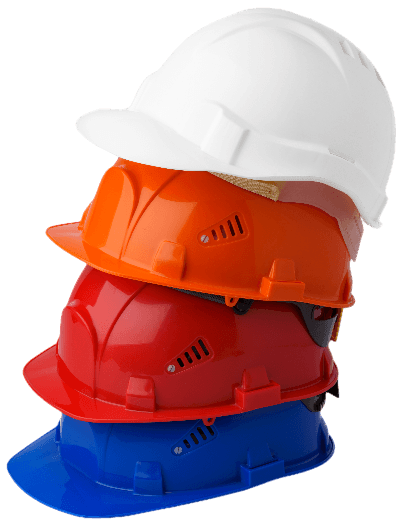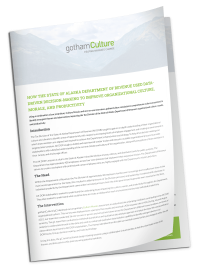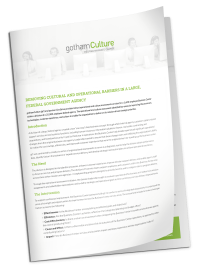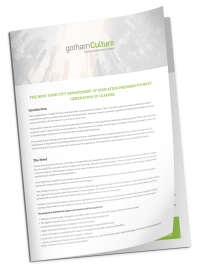Increase Your Organization's Potential with gothamCulture
Increase your organization's potential with our expert consulting in culture refinement, leadership development, employee training, and strategic alignment for both corporate and government sectors. Transform and thrive with our targeted, high-impact solutions.

Trusted by Organizations of All Sizes:






Services
Our team helps organizations uncover the underlying causes of performance obstacles and empowers leaders to drive change through the lens of organizational culture and strategy. Our senior practitioners have real industry experience; not just textbook knowledge. No matter how large or small the engagement, our core staff and robust network of subject matter experts are able to scale and scope to provide whatever support you need to drive success.
Who We Are
At gothamCulture, we specialize in transforming your organizational culture, leadership, and people strategy into engines of success. With over fifteen years of experience, our research-based approach is designed to create sustainable change, ensuring your company’s growth and improvement. We believe in hands-on engagement and building capabilities within your teams to drive long-term success. Here’s how we uniquely position ourselves:
Research-Based Strategies: We rely on proven methodologies and tools refined through years of practice to guide our culture assessment and change processes.
Extensive Experience: Our team brings over fifteen years of experience in developing culture strategies with globally recognized brands.
Sustainable Results: Our history is marked by performance gains and lasting client relationships.
Case Studies
At gothamCulture, we specialize in transforming your organizational culture, leadership, and people strategy into engines of success. With over fifteen years of experience, our research-based approach is designed to create sustainable change, ensuring your company’s growth and improvement. We believe in hands-on engagement and building capabilities within your teams to drive long-term success. Contact us to discover more about how we can make a difference together.
Testimonials
— VP of Customer Support, JetBlue Airways
— SVP of Publishing, Martha Stewart Living Omnimedia
FAQs
gothamCulture utilizes an evidence-based ADDIS methodology for culture change, focusing on the underlying beliefs, assumptions, values, and ways of interacting within an organization. This approach involves highly engaging and rigorous assessments to quantify and leverage organizational culture as a lever for change. Our team supports clients in areas such as culture transformation, startup/rapid growth culture, safety culture, culture in mergers & acquisitions, customer experience culture, and culture management, aiming to link organizational culture aspects directly to performance outcomes. For more information, visit our Organizational Culture Consulting page.
gothamCulture’s leadership development service is tailored to equip leaders at all levels—from front-line managers to senior executives—with the skills needed to enhance team productivity and drive tangible performance results. We offer a range of services including executive and team coaching, leader learning and development programs (both pre-existing and custom-designed), leadership team and board alignment, and support for new leader assimilation. Each program is designed to align with the organization’s culture and strategic goals. For more information, visit our Leadership Development page.
gothamCulture offers comprehensive support for developing, implementing, and evaluating people strategies that place employees at the heart of your business operations. Our services range from advisory support to full business process outsourcing, covering areas like strategic people planning, people analytics, employee engagement, surveys and assessments, performance management, process improvement, and reward and recognition systems. This ensures that your people strategy aligns with your business goals and supports the growth and retention of your employees effectively.
gothamCulture provides a range of executive and team coaching services tailored to various leadership levels and team dynamics. Our services include one-on-one executive coaching for senior leaders, leader coaching for mid-level leaders, team coaching for entire leadership teams, and feedback coaching focused on assessment debriefing. Each program is designed to enhance self-awareness, leadership effectiveness, and organizational impact, with durations varying based on the specific coaching engagement.
gothamCulture offers a wide range of employee training services, including delivery of customized, pre-existing courseware across themes such as Conscious Leadership, Communication, Project Management, Presence, Influence, and Training Others. We also specialize in courseware development tailored to the specific needs of an organization, ensuring alignment with strategic goals. Additionally, we offer content licensing and train-the-trainer sessions to enable clients to facilitate their own training programs. For more information, please visit our Employee Training page.
gothamCulture offers consulting services to government and military agencies aimed at aligning organizational culture, leadership, and people strategy with performance goals. This includes DEIA initiatives and customer experience improvement. We provide easy access for government buyers at all levels to engage through various procurement vehicles. Additionally, through Gotham Government Services (GGS), we deliver learning and performance improvement services to federal clients. For more information, please visit our Government Consulting page.
The Mosaic Performance Framework is a suite of organizational assessments designed by gothamCulture to improve performance by understanding and managing key factors of organizational culture, leadership effectiveness, and team dynamics. Grounded in the Competing Values Framework, it provides actionable data to help organizations align their internal dynamics with their strategic goals, ensuring sustainable performance. This comprehensive approach enables leaders to proactively shape their organization’s performance through ongoing assessment and adjustment. For more information, please visit our Mosaic Performance Framework & Assessments page.
Culture Change is a Complex Process
Make sense of it with actionable advice from experts on the front lines.
You've successfully been added to our list. We're glad to have you!



